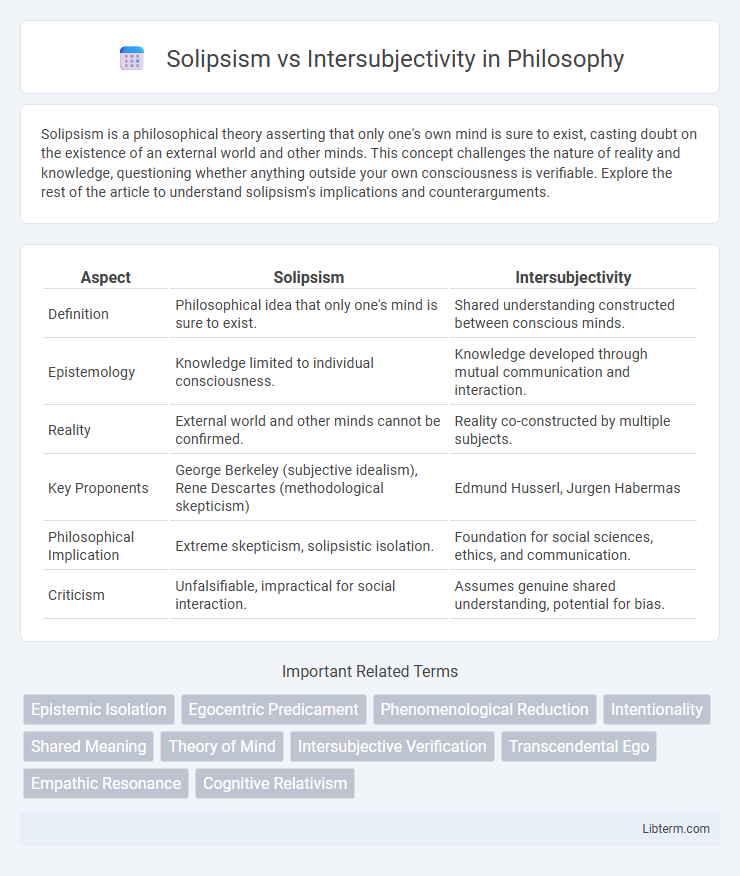Solipsism is a philosophical theory asserting that only one's own mind is sure to exist, casting doubt on the existence of an external world and other minds. This concept challenges the nature of reality and knowledge, questioning whether anything outside your own consciousness is verifiable. Explore the rest of the article to understand solipsism's implications and counterarguments.
Table of Comparison
| Aspect | Solipsism | Intersubjectivity |
|---|---|---|
| Definition | Philosophical idea that only one's mind is sure to exist. | Shared understanding constructed between conscious minds. |
| Epistemology | Knowledge limited to individual consciousness. | Knowledge developed through mutual communication and interaction. |
| Reality | External world and other minds cannot be confirmed. | Reality co-constructed by multiple subjects. |
| Key Proponents | George Berkeley (subjective idealism), Rene Descartes (methodological skepticism) | Edmund Husserl, Jurgen Habermas |
| Philosophical Implication | Extreme skepticism, solipsistic isolation. | Foundation for social sciences, ethics, and communication. |
| Criticism | Unfalsifiable, impractical for social interaction. | Assumes genuine shared understanding, potential for bias. |
Understanding Solipsism: The Philosophy of the Self
Solipsism asserts that only one's own mind is sure to exist, emphasizing the subjective nature of personal experience as the sole source of knowledge. This philosophy challenges the certainty of external reality and other conscious minds, positing that all external entities may be constructs of the self. Understanding solipsism involves exploring the limits of self-knowledge and the epistemological skepticism that questions the existence of an independent, shared world.
Defining Intersubjectivity: Shared Realities
Intersubjectivity defines shared realities through the mutual understanding and co-creation of meaning between individuals within a social context. Unlike solipsism, which centers on the self's exclusive knowledge of existence, intersubjectivity emphasizes collaborative cognition and the validation of experiences across multiple subjects. This foundational concept underpins communication, social interaction, and the construction of collective knowledge, highlighting the relational nature of reality.
Historical Roots of Solipsism and Intersubjectivity
Solipsism, rooted in 17th-century Cartesian philosophy, emphasizes the primacy of the self's mind as the only certain existence, originating from Rene Descartes' methodological skepticism. In contrast, Intersubjectivity emerged from phenomenology and existentialism in the early 20th century, particularly through Husserl's exploration of shared consciousness and Heidegger's emphasis on being-with-others (Mitsein). These historical foundations highlight solipsism's focus on individual certainty versus intersubjectivity's emphasis on relational existence and mutual understanding.
Key Philosophers and Influential Theories
Solipsism, notably explored by Descartes, asserts that only one's own mind is certain to exist, emphasizing radical skepticism about the external world. Intersubjectivity, advanced by philosophers like Husserl and Schutz, argues for the shared, communal constitution of reality through mutual understanding and social interactions. Husserl's phenomenology and Schutz's social theory highlight how consciousness and meaning emerge from relational experiences, contrasting the isolated certainty proposed by solipsism.
Epistemological Differences: Knowing the Self vs. Knowing Others
Solipsism asserts knowledge is limited to one's own mind, emphasizing the self as the sole certainty in epistemology. Intersubjectivity challenges this by proposing that knowledge arises through shared experiences and mutual understanding between conscious individuals. This fundamental epistemological difference highlights solipsism's internal perspective versus intersubjectivity's relational framework for knowing others.
The Problem of Other Minds: Solipsism’s Core Challenge
The Problem of Other Minds highlights solipsism's core challenge by questioning the existence of consciousness beyond one's own mind, asserting that knowledge of other minds is inherently uncertain. Intersubjectivity counters this by emphasizing shared experiences and mutual understanding as foundational to social reality and communication. Neuroscientific evidence and phenomenological philosophy support intersubjectivity, demonstrating that human cognition is deeply relational, undermining solipsistic isolation.
Intersubjectivity in Communication and Language
Intersubjectivity in communication and language emphasizes shared understanding and mutual construction of meaning between individuals, enabling effective interaction and coordination. It involves the alignment of perspectives, intentions, and knowledge, crucial for conversational coherence and the development of social norms. Unlike solipsism, which centers on the self as the sole reality, intersubjectivity highlights the communal aspect of meaning-making fundamental in linguistic exchanges.
Psychological Perspectives: Subjectivity and Shared Experience
Solipsism asserts that only one's own mind is certain to exist, highlighting extreme subjectivity and the challenge of validating external reality. Psychological perspectives on intersubjectivity emphasize the shared experiences and mutual understanding that emerge through social interactions, facilitating empathy and cognitive development. Research in developmental psychology shows that intersubjectivity is crucial for theory of mind and forming coherent personal identity within a social context.
Critiques and Limitations of Solipsism
Solipsism faces significant critiques for its inherent epistemological limitations, as it denies the existence of any reality beyond the self, making knowledge of an external world or other minds impossible to verify. This radical subjectivity undermines meaningful communication and shared understanding, which are foundational in intersubjectivity, where knowledge emerges through mutual recognition and social interaction. Critics argue solipsism's isolationist perspective is impractical and intellectually restrictive, failing to account for the interdependent nature of consciousness and experience highlighted in intersubjective frameworks.
The Practical Implications of Intersubjectivity in Society
Intersubjectivity fosters shared understanding and cooperation by emphasizing collective experiences and mutual recognition, which underpin effective communication and social cohesion. This concept enables diverse individuals to navigate complex social environments, facilitating empathy, trust, and collaborative problem-solving essential for functioning communities. As opposed to solipsism's focus on isolated self-awareness, intersubjectivity supports societal stability through interconnectedness and the validation of multiple perspectives.
Solipsism Infographic

 libterm.com
libterm.com